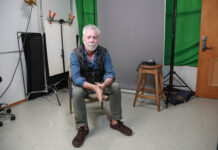Kelly Goff
Jack grew up in the Valley.
He celebrated birthdays with his large extended family and friends in backyard events. He sang in the choir at his high school. He graduated with honors.
When he was 18, he asked if he could get his driver’s license, the last rite to becoming an adult, as his parents had promised him he could when they had denied the request two years prior.
That’s when he found out that he was not going to be driving at all. As an illegal immigrant, he wasn’t allowed to.
“I didn’t know until my sister told me,” Jack (whose name was changed for this story) remembers. “When I came here I was less than a year old. I went to school, and until I was 18, I thought that I was American.”
The son of Asian immigrants, Jack’s father came to the United States when his mother was pregnant, and about a year later, his mother followed suit, bringing Jack and his older sister with her on two-week travelers’ visas.
They just never went home.
Over the course of the 23 years since their arrival, his parents have established themselves financially.
“They came basically chasing the American Dream.”
The family has struggled with their status, and one by one, each of them has finally come to possess that treasured citizenship.
“My older sister married for love. She’s pregnant and having a baby,” Jack says. “She was able to petition my parents, so now they are legal. My little sister was born here in Glendale, so she is a citizen.”
Only Jack still struggles with hiding his status.
“I mean, I’m American. I don’t know any different. I don’t even know exactly what my status is in the country that I was born in. I was born on an island that was just their protectorate, where the people aren’t granted citizenship in that country. I’ve renewed my passport at the consulate, but I’m still not really clear about what that means.”
He struggled with future plans after his discovery, knowing that now he couldn’t get a job, couldn’t continue with his plans if he were to graduate.
“I tried to find a way to get my citizenship. I married one of my best friends. We went to Vegas, she signed an affidavit of support, meaning she’d make sure I was financially well off until my green card came through, we got married and we moved in together.”
Shortly after that, though, things unraveled between them.
“We never even started the (immigration) paperwork,” he laments. “And then I moved back into my parents’ house.
“We’re still married, but I don’t know how to really approach her right now, even though we’ve started talking again. I guess I have to figure it out.”
After he discovered that he wasn’t really a citizen, Jack worked for his father’s company for a few years, before hearing about a cousin who had enrolled at Pierce College.
“I had a passport from (my country of birth), and I’d graduated from a California high school, so I could take classes and get in-state tuition, so I went back to school.”
Without a divorce so that he can marry someone else, or the support of his wife to reconcile and sponsor his immigration, he is struggling to wrap his head around his future.
“I mean, I can work a bit. I work for my dad sometimes, and I can do some other jobs in my field that pay me, but I can’t really graduate and get a job.
“Unless a company will sponsor me, I don’t know how to get this taken care of so I think that I’m going to change my major and just keep studying.
“I’m thinking about taking some theater classes in the spring,” he muses.
Throughout his studies, he has managed to keep his status under tight wraps. None of his classmates know, or would even suspect, that he is undocumented.
“Only a few of my closest friends know… and you,” he says.
He carries his passport when he goes out and it usually gets him into bars and clubs.
“I’m still always nervous that it won’t work and my friends and I won’t be able to go where they want to go, or that they’ll get annoyed that I can’t get in.”
The idea of what his friends, teachers and classmates think about him seems to be a time-consuming preoccupation for Jack.
“I’ve always been laid-back, but now I’m even more so. I’m always trying to please people.
“I guess, in the back of my mind, if I ever get caught or in trouble (with immigration), I want to know that no one can ever say that I’m a bad person, or that I don’t deserve to be here.
“I want to be able to show that I’m doing good. I want to be able to show that I’m learning and contributing to society and that I belong here.”
From his vantage point, where no one knows his status, Jack has also been able to listen in on conversations that he might never have heard were his ethnicity or speech stereotypical of an illegal immigrant or if the people around him knew his status.
“I know that there are people that wouldn’t talk to me anymore. I have friends who are very strongly anti-immigrant, and I know that telling them wouldn’t make them any different.”
Jack is not alone in his status. While he may think that it would be shocking for his friends to find out, many students in California are facing the same dilemmas.
In 2001, the state Legislature passed AB540, a bill that provided undocumented students with a way to attend any of the schools in the University of California, California State University or community college system.
The bill allows undocumented students to enroll in classes at a in-state resident tuition rate provided that they completed three or more years in a California high school, have graduated or will graduate from a California high school and will sign an affidavit saying that they will straighten out their immigration status as soon as possible.
While the affidavits are not required by all schools, students must be prepared to sign them. Still, they are not filed with the Immigration and Naturalization Service (INS) and remain confidential.
Jack signed one of these affidavits for Pierce, and says that they have not followed up on his status.
Although he could be eligible to transfer to a four-year university, he is saddened by the thought that, for now, he cannot go to school out-of-state.
“I always wanted to go somewhere else. I want to know what it’s like to be free from family ties and be independent. Right now, I’m totally dependent on my family. But I guess that I could go somewhere else in state.”
Pierce has long been a diverse student body. President Robert Garber recalled that in the 1970s, when he was teaching here, “I literally saw the influx of Vietnamese students, and then the Persians after the Shah fell, the Russians to a lesser extent, all the way to the Hispanic immigration now.”
Garber feels that this immigration has resulted in a positive “layering of cultures” rather than the “inculturation, the melting pot theory from the turn of the last century.”
The current type of immigration, where newcomers still embrace the country of their home culture, has resulted in a “phenomenal acquisition of knowledge and culture,” Garber added.
He expressed pride in the fact that Pierce earned a Title V grant for being a “Hispanic serving institution,” and noted that some of the most impressive students that he has known and worked with in his years as both a teacher and administrator have been immigrants.
For Jack, the knowledge that he still must cross an enormous hurdle is daunting. “I have things that I want to do, I just don’t know how to take care of this right now.”
He continues, “I don’t know what I would do if they tried to send me back. I don’t even know the language.
“I know my culture and I know a few words of the language that I have picked up from my family, but that’s it.”
He plans on continuing to study and try to figure out a way to correct his status.
“This is home for me.”
“It’s this huge misconception that people have that all the illegal immigrants crossed a border or on a boat illegally. I’ve been here. It’s all I know.
“I am American.”

“Jack’s” baby passport, with name and personal information removed at his request. ()

(Adrian Sanchez-Gonzalez)


